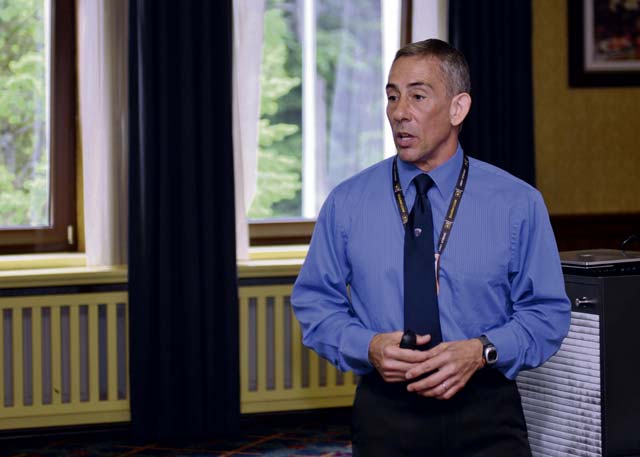
For more than five years, the Army has worked toward developing resiliency in Soldiers and ensuring they have the skills necessary to bounce back from adversity and focus on the positive experiences in their lives.
For the 21st Theater Sustainment Command and other Army organizations within the KMC, working toward resiliency starts at the top.
“We’re talking about strong leadership, Army strong, resiliency,” said Maj. Gen. John R. O’Connor, commanding general of the 21st TSC, to senior leaders from across the KMC who came together May 30 on Vogelweh to learn about the leader’s role in resiliency.
O’Connor said leaders must be resilient.
“We as leaders need to not only set the example with all that we do, but that we do it in a positive sense that creates an atmosphere where people want to wake up in the morning, come to work and do the right thing,” he said.
With recent changes to the Comprehensive Soldier and Family Fitness program, commands all the way down at the company level are now required to maintain master resilience trainers, making even the youngest of leaders responsible for resilience training within their organizations.
The course allowed MRTs and program coordinators to “train leaders on resilience and at the perspective of MRTs so that they have an understanding of what resilience is, what right looks like and so they can ensure that when the MRTs are training, they are doing it to standard,” said Erika Turner, 21st TSC’s Comprehensive Soldier and Family Fitness program manager.
“It’s a big added value to leaders,” Turner said. “If you’re a leader, you want a Soldier who operates at a higher performance and is more aware of themselves and how they communicate with others.”
Having the ability to bounce back from adversity and to keep “hunting the good stuff” are key aspects of Soldier performance that keep units running smoothly and effectively.
“One of the major pieces of resiliency is that it enhances the performance of the Soldier,” Turner said. “People who are looking at life from an optimistic standpoint are going to identify and focus on those positive things and become better performers.”
While the training is intended to help leaders identify requirements for their MRTs and ensure Soldiers are being trained in resiliency techniques, leaders who exhibit strong resilient qualities also help Soldiers to become more resilient.
“The senior leader’s role in resiliency is very important,” said Sgt. 1st Class Ronnell Foster, 21st TSC’s CSF2 NCOIC. “Younger Soldiers look up to their leaders and if their leaders are able to show resiliency, it will help the younger troops believe more in the program.
“As long as you’re open-minded and can live by the program, it will be easier for junior Soldiers to pick it up,” Foster added.


